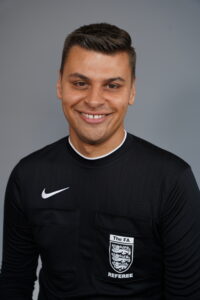You may want to go on a road trip for your holiday this year. Would you just simply pack up your things, hop in the car and then drive off without having a clue as to where you were actually going? Of course not! You would have to have a specific destination in mind for your journey, a place that you’d really like to get to, otherwise, you’d end up spending your entire holiday driving aimlessly around.
However, having a desired endpoint for your trip isn’t enough to guarantee that you’ll actually get to where you want to go. Additionally, it is equally important that you need to have very clear directions for the specific routes and towns all along the way that will eventually lead you to where you want to go.
This is how goals work. First, you should have a big, ambitious destination, a long-term goal, that you’d really like to get to somewhere down the line in your refereeing career. Secondly, you need to know what “routes” to take along the way and the places you’ll pass through in order to turn that dream into a reality. That is, you must have smaller, more immediate short-term goals that when achieved, will systematically lead you to your dream. To go as far as possible in your officiating career, you must learn how to effectively use both kinds of goals.
Your long-term goal is what is sometimes called a “big enough why.” It’s the primary reason why you train and referee. Your “big why” provides you with the “fuel” or motivation and excitement to keep on keeping on through hardships and setbacks. This long-term goal can be as varied as gaining promotion to the Premier League list of officials, getting a cup final appointment, or getting to a certain level on the ladder.
There are two important rules to follow when considering an effective long-term goal. The first is related to ownership. Your long-term goal must belong to you, and not your parents, your partner or your referee coach/manager. Second, you need to be sure that your long-term goal really excites YOU. It needs to be something that YOU really want to achieve. On a daily basis, your long-term goal should answer the question, “Why am I doing this?” If that big goal is exciting and meaningful enough to you, then you’ll have a good reason to regularly and consistently push yourself outside of your comfort zone to do what’s necessary for success.
If your long-term goal marks the final destination of your officiating journey, then your short-term goals are all the roads and cities that you must travel through to get there. Your short term goals provide you with both direction and a source of ongoing motivation. Because your long-term goal is so far off in the future, it’s easy to lose sight of your progress week to week and month to month. By setting smaller, intermediate goals that you can work on during the year and then breaking those down into even smaller weekly and daily goals, you will have a better perspective of the progress that you’re actually making. The successive achievement of these short-term goals keeps your motivation to train high and keeps you moving towards that big, far-off goal.
There are two kinds of short-term goals:
- “Outcome” goals which reflect discreet achievements like getting your highest mark from an observer, reaching the top of your banding table, or getting appointed to a cup final. These outcome goals are like those towns that you must drive through on your trip in order to ultimately reach your final destination.
- “Process” goals which focus more on exactly “how” you will successfully reach all of your outcome goals. Process goals are like the specific roads that will lead you to where you want to go. Examples of “process” goals are training 5 time a week, correcting a specific technique mistake in your discipline procedure, learning how to consistently identify foul play or learning to stay calm and collected under competitive pressure.
Another useful way to understand the relationship between short and long-term goals is to consider the riddle, “How do you eat an elephant?” Answer: One bite at a time! The elephant represents that big, far-off, long-term goal of yours. By chunking that big dream down into manageable, bite-sized pieces and then working and focusing on these, “one bite at a time,” (i.e. your daily, weekly and monthly short term goals) you will be able to maintain your ongoing motivation with each “bite” you successfully take.
As you work towards that big dream in your refereeing career, your ultimate success depends almost entirely on how well you handle the potholes and rocky patches that you will always encounter along the way. No journey worth taking is ever smooth from start to finish. There will always be setbacks, failures, and breakdowns that you must persevere through. A good rule of thumb to follow which will help you navigate these rough patches is, The problem isn’t the failures and setbacks. The problem is how you react to them.
You need to expect that there will be difficult, discouraging times. They are a normal part of any important quest. When you hit one of these “bumps in the road,” get lost or go down a dead-end, don’t despair. Instead, turn yourself around and keep going! Remember, success is always one or two towns beyond failure.
So, once you finally reach your big goal and achieve that long sought-after success, what then? Simple! Think about another “trip” that you’d really like to take, another emotionally important goal that you want to achieve, and then start the whole process over again!
At The Third Team I work individually and in collaboration with different professionals where I have developed workshops and 1-2-1 sessions associated with Resilience and Mental Toughness Development to help referees. The workshops and 1-2-1 sessions are interactive, where referees are encouraged to open up and share their experiences to help themselves and each other.
Feel free to contact me if you’d like to know more about my workshops or 1-2-1 sessions and how I could help you or your officials.
Best Wishes,

Nathan Sherratt
Referee Educator & Managing Director of The Third Team

Nathan Sherratt
Nathan Sherratt, Referee Educator, Resilience Trainer and Managing Director of The Third Team. A Mental Toughness Practitioner based in County Durham, North East England.

